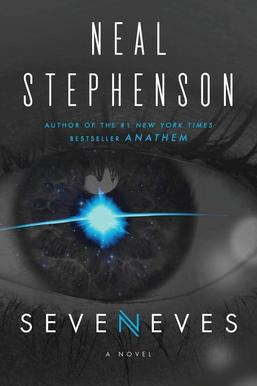Seveneves, Vox Day, and Blowing Up the Moon
 This is an essay from my forthcoming collection Guided by the Beauty of Their Weapons: Notes on Science Fiction and Culture in the Year of Angry Dogs, out on December 27th, and available for preorder on Amazon. (Print will be available when the book comes out on December 26th.)
This is an essay from my forthcoming collection Guided by the Beauty of Their Weapons: Notes on Science Fiction and Culture in the Year of Angry Dogs, out on December 27th, and available for preorder on Amazon. (Print will be available when the book comes out on December 26th.)
There are two obvious angles to take on Seveneves given the discussions that make up the rest of this book. The first is to attempt to decipher Vox Day’s hatred of the book, an effort that involves getting deep into the weeds of scientific racism. The second is to try to figure out what it is with blowing up the moon these days. In the spirit of Seveneves itself, then, we’ll try to do both without any regard for whether they actually fit together.
First the moon. As with the other obvious touchstone here, Kill the Moon, its destruction is part of a larger story that wrestles with the changing status of space travel as a signifier in science fiction. In this regard, on a basic level, it serves as a symbolic breaking of a barrier. In 2015, it appears entirely likely that the moon will prove to be the furthest point humanity reaches prior to its extinction. And in both Kill the Moon and Seveneves its destruction is the impetus for rejecting that in favor of a different sort of future.
In Kill the Moon at least this is a reasonably complex event rooted in the long history of Doctor Who, which stretches back through the new frontier liberalism view of space travel, and serves to reconcile that utopian vision with the present day. And ultimately, Doctor Who taking place in a universe where the only thing that decisively isn’t canon is the Fermi Paradox, which means that this reconciliation ultimately has to be a restoration of a very classic mode of science fiction, which it is, with the shattered moon ultimately restored so that the future we long dreamed of can arrive.
Seveneves, on the other hand, is a Neal Stephenson novel, and thus focused first and foremost on the technical and material realities of the world. Where Kill the Moon is firmly about space as a symbolic concept, Seveneves is about the ways in which space travel is a massively difficult science and engineering problem. Or, to put it another way, it’s about why the classic sci-fi fantasy of space travel is not plausible in the first place. It’s a novel of radiation sickness, tiny and fatal punctures, and fuel conservation. Being Neal Stephenson, all of these technical bits are brilliant and gripping, of course, but they are very much the focus of the exercise.
And so in Seveneves the moon’s destruction exists to create a much harder problem that will require humanity to solve the hard problems of space. But this puts the book in something of an odd position. Stephenson has to advance the current state of space technology just a little bit past the present day in order to come up with a plausible way for humanity to survive (most obviously in the form of plausible asteroid mining), and has to create an entirely artificial and ostentatiously unexplained planetary crisis in the form of the moon exploding in order to justify it.…
